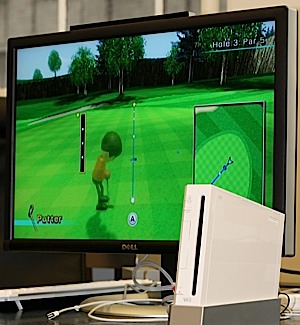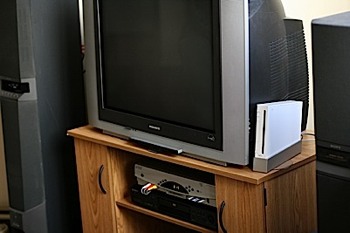How Nintendo can save the Wii
I have a Nintendo Wii, and it's a great little system. Everyone who sees it for the first time instantly jumps in and plays Wii Sports, even people who would never otherwise pick up a video-game controller. It's much more innovative, well-designed, and affordable than the Xbox 360 or Playstation 3.

The Wii is still sold out almost everywhere, almost 5 months after its launch. Nintendo can't make them quickly enough to meet demand. And they're making a killing on each system, while Sony and Microsoft lose money on each console sold. By all initial indicators, the Wii is a huge success.
But when I describe it as "little", I'm not just referring to the size. It's also extremely limited in usefulness, gameplay depth, and replay value. As fun as it is in parties, it's a terrible system for solo gameplay. And I think it will only get worse.
Unless Nintendo makes some changes to their software strategy, I can't recommend the Wii to others.
Usefulness
The "Wiimote" controller is great, and very clever: it enables entirely new types of games. But most existing genres are either awkward with or wasteful of the Wiimote's design. This is fine for Nintendo's custom Wii games, but it's difficult to enjoy existing franchises and genres.
There's always-on WiFi, a web browser, and email. But none of this is used to enable online gaming. And Nintendo's future plans seem to exclude anything but playing with prearranged, white-listed friends (by entering long "friend codes" into each other's Wiis). The point of online gaming is to have opponents available any time you want to play, and offer a wide range of opponents for challenge and variety, but the Wii offers neither.
There's an SD-card slot that can be used to display photos, but there's no way to use the SD slot or the network connection to play videos. Also, despite having a DVD drive, the Wii cannot play DVD movies. So it can't serve a role as a media center.
It's really only useful for gaming. That's fine, since it's a game console... but then it relies completely on the strength of its game library, not possible secondary uses.
While it can play games from older consoles, including the Gamecube, doing so requires additional controllers to be plugged into the Wii or Wiimotes. The controllers have minimal cross-compatibility, so you cannot, for instance, use a GameCube controller to play SNES or Genesis games, nor can you use the "Classic" controller to play GameCube games. Plus, nobody wants to spend $5-10 (plus the cost of the additional controllers) on old games that they were tired of 10 years ago. The Wii is primarily useful for playing Wii games.
Gameplay depth and replay value
The Wiimote is great for simple motion-based mini-games, so most of its good titles have been mini-game collections, including the excellent Rayman: Raving Rabbids and the mediocre Super Monkey Ball: Some Kind Of Extremely Japanese Happy Fun Blast. Many upcoming Wii titles are also mini-game collections. But these have very limited replay value because the gameplay is so shallow. A system cannot survive with mini-games alone, no matter how many you can cram onto one disc.
The best Wii game by far, according to almost all owners, is Wii Sports. (And it's free with the system.) It's a great game for solo play and parties, but it gets old quickly. Wii Sports is mostly made to show off the system in a slightly more useful way than a tech demo, and serve as a Wiimote tutorial. It's not meant to solve the long-term sports market. It's intentionally very limited to keep gameplay simple and fast: baseball only lasts 3 innings, there are only 9 holes in golf, and the tennis simulation is extremely oversimplified (hint: it doesn't matter how hard or in what direction you swing).
Nintendo's other launch titles were very weak, with the single notable exception of Zelda. (But I don't like fantasy or RPGs. Damn.) Unfortunately, there have been very few other games worth playing more than once.
Third-party support
Nintendo decided to simplify the Wii's hardware so it could be small, cool-running, and inexpensive. There are many benefits to this strategy, especially given how cheap, quiet, and portable the Wii is compared to the Xbox 360 and Playstation 3. I comfortably carried the Wii and all of its accessories home from work in a messenger bag... with a laptop and an SLR camera (and their accessories).
But the game development market doesn't respect a system in 2007 that doesn't seem more graphically powerful than a GameCube (which nobody has respected since 2001). When Electronic Arts publishes a new game from a franchise that they acquired and ruined years ago, they want to make the same game for every major game console and PCs with few differences, because targeting only one system forces them to miss out on most of the market. This has two implications:
- Side-by-side screens between systems make the Wii look awful and dated.
- Wii gameplay is an afterthought, so very little effort is spent optimizing the controls for the Wiimote.
As a result, third-party games on the Wii are bound to suck. And so far, they mostly have. Nintendo cannot count on Electronic Arts or whoever else is left in the third-party publishing wasteland to provide great games for the Wii.
By now, you probably get the point: the Wii has problems. So I'll move on to how Nintendo can fix it.
It's a start: Wii Pro Sports
This is simple: Wii Sports is the best game on the Wii by far, but it's shallow and limited. Nintendo should take advantage of what they've started, and finish it.
Take the best Wii Sports games and release a separate Pro version of each one, possibly staggered throughout a year so there's big hype every few months.
Golf would be the best one, and it would benefit most from having its own dedicated game. Give it a ton of courses (Tiger Woods 2007 has 21) and have some randomizing elements: move the hole around the green, randomize the green's elevations, or even generate completely random courses. Then add a putt-putt minigame. Might as well - the engine's already there.
Then add an online component. At minimum, give us high-score tables and random-seed numbers that generate good courses. But what we really want is an online play system so we can stay up until 2 AM playing Wii Sports against random people in Idaho after all of our Wii-owning friends have gone to sleep.
Without online play, Wii Pro Golf could still be the #1 Wii game. And if they could pull off an online play system, similar Pro games could be very successful for bowling, tennis, and baseball. (I think boxing is awful, but maybe someone would like it.)
The real plan: an open API

The Wii offers, for $250 (including Wii Sports and one Wiimote):
- An intuitive wireless pointing device (the Wiimote) with some buttons and a built-in speaker
- A moderate-speed PowerPC CPU and a decent ATI GPU that can output 480p
- 64 MB of system RAM and 24 MB of video RAM
- WiFi and Bluetooth
- A DVD drive
- 512 MB of internal flash memory
- An SD card slot (you could get a 2 GB SD card for about $35)
- Two USB ports
- Very low power consumption in a small, quiet package
It's a homebrew-software dream system.
Microsoft has always ignored this potential and locked down the Xbox and the 360, but fans found a way around the restrictions on the original Xbox and created a bunch of great independent software, including the amazingly useful XBMC. Homebrew software only runs on modded (physically altered or hacked) Xboxes, and the compiled version of the program is illegal and hard to find. Only a tiny fraction of Xboxes ever had the capability to run homebrew software, yet this project and many others have thrived and matured.
Imagine what the Wii community could produce with the Wii's better, cheaper, more versatile hardware if their software could run on every Wii ever sold.
Sony saw the massive (hacked) homebrew community around the PSP, so the Playstation 3 comes ready to run independent software right out of the box: there's a "Boot OS" command in one of the menus that will boot any PowerPC-compatible OS right from the Blu-Ray drive. People are already using it to beat all of the records in Folding@Home.
And Sony is losing money on each PS3. They have to sell games and accessories to generate a profit. Nintendo makes a significant profit on the Wii hardware already, so they don't even have to worry about tons of hackers buying Wiis just to use for Linux appliances and media centers.
If Nintendo opened the Wii to running homebrew games and applications, it could become far more useful. Not only are independent developers more likely to optimize original games for the Wii, but the PC-class hardware and peripheral options can open up completely new uses instead of limiting it to a game console.
Why not?
It would be a bold move for Nintendo. They've never opened access to anything.
But they took a major risk with the Wii. They realized that the direction of game consoles was becoming stale, and it needed a major change. But they've only done half of the job.
Come on, Nintendo. Complete the transition and make the Wii shine.